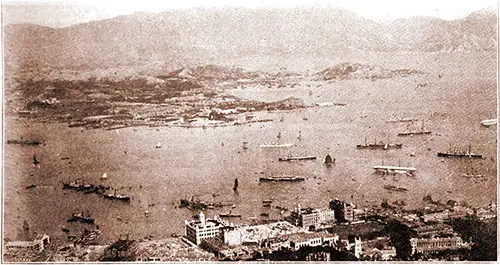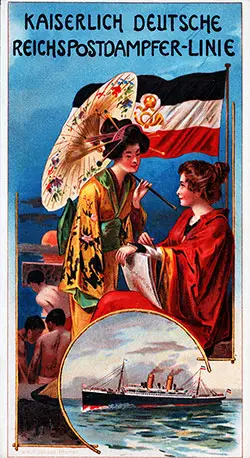Hong Kong Passenger Lists 1900-1932

View of Hong Kong Harbor in 1919. | GGA Image ID # 17180da4ee
Passenger Lists available from the GG Archives from the Port of Hong Kong. Organized by Date of Departure, Steamship Line, Steamship or Ocean Liner, Class of Passengers, Route, and the Ship's Captain.
Hong Kong is situated in latitude 22 degrees 14 minutes north, longitude 114 degrees 10 minutes east. The total civil population, estimated in 1916, was 529,010, consisting of 13,390 non-Chinese and 515,620 Chinese. Properly speaking, the name of Hong Kong is used in connection with the island of that name, the seaport being Victoria; in maritime circles, however, the word Victoria is seldom used, and the name of the island is usually applied to the town of Victoria itself.

1900-09-04 SS Bayern Passenger List
Steamship Line: North German Lloyd / Norddeutscher Lloyd
Class of Passengers: Cabin
Date of Departure: 4 September 1900
Route: Bremen to Hong Kong via Antwerp, Genoa, Colombo, and Singapore
Commander: Captain H. Bleeker

1926-09-30 SS President Van Buren Passenger List
- Steamship Line: Dollar Steamship Line
- Class of Passengers: Cabin Class
- Date of Departure: 30 September 1926
- Route: New York to Marseilles via Havana, Cristobal, Balbao, Los Angeles, San Francisco, Honolulu, Kobe, Shanghai, Hong Kong, Manilla, Singapore, Penang, Colombo, Port Said and Alexandria
- Commander: Captain M. Ridley

1929-04-20 Empress of Asia Passenger List
Steamship Line: Canadian Pacific Line
Class of Passengers: First and Second Class
Date of Departure: 20 April 1929
Route: Vancouver and Victoria to Manila via Yokohama, Kobe, Nagasaki, Shanghai, and Hong Kong
Commander: Captain A. J. Hailey, R.N.R.

1930-06-12 SS Empress of Canada Passenger List
Steamship Line: Canadian Pacific Line
Class of Passengers: First and Second Class
Date of Departure: 12 June 1930
Route: Vancouver and Victoria to Manila via Honolulu, Yokohama, Kobe, Shanghai, and Hong Kong
Commander: Captain A. J. Hailey, R.N.R.

1932-08-05 SS Empress of Canada Passenger List
Steamship Line: Canadian Pacific Line
Class of Passengers: First Class and Tourist Third Cabin
Date of Departure: 5 August 1932
Route: Manila to Victoria and Vancouver via Hong Kong, Shanghai, Kobe, Yokohama, and Honolulu
Commander: Captain A. J. Hailey, R. N. R.

1932-10-22 SS Empress of Canada
Steamship Line: Canadian Pacific Line
Class of Passengers: First and Tourist Class
Date of Departure: 22 October 1932
Route: Vancouver and Victoria to Manila via Honolulu, Yokohama, Kobe, Shanghai, and Hong Kong
Commander: Captain A. J. Hailey, R.N.R.
The island is situated off the coast of the Kwangtung Province of South China, near the mouth of the Canton River, and is 90 miles from Canton, and about 40 miles from the Portuguese colony of Macao, on the mainland of China. The hot season begins in May and continues until October. The winter months are cool and dry.
The Island of Hong Kong has been in possession of the British since 1840, and in the comparatively brief period which has elapsed since that date, it has risen to the importance of being the chief seaport in the Orient, and only a year or two ago, from the point of tonnage passing through the pert, was the chief port of the world. It is aptly described as the “Charing Cross” of the Orient. It is a British Crown colony and has a governor and legislative body administering its affairs. The currency is in bank notes, government dollars, and subsidiary coinage of various denominations.
The harbor at Hong Kong is one of the finest in the world, situated as it is quite close to the Kowloon Peninsula, the high hills of the island itself on the one side and the hills of the mainland on the other, in conjunction with the shelter afforded by the many bays, both on the mainland and on the island, make it an ideal place for the loading and discharging of craft of all descriptions.
In its early history the governors of the island decided that its close proximity to the mainland rendered it unsafe for British interests, and a treaty was subsequently arranged with China, whereby Great Britain obtained a 99-year lease of a large portion of the mainland opposite the island, by this means securing additional protection against possible depredations of marauding tribes, which even the Mandarin government in China could not subdue.
⚠️ About Accuracy in Historical Records Research Tip
Context. The GG Archives presents passenger lists as faithfully as possible to the original documents. While OCR is generally accurate, portions of these collections—especially image captions and some transcriptions—are typed by hand and may include typographical or spelling variations. The original manifests themselves also contained clerical inconsistencies (names recorded phonetically, mid-voyage corrections, etc.).
What this means for your research:
- Search variant spellings of names (e.g., “Schmidt/Schmitt/Smith,” “Giuseppe/Joseph”).
- Cross-reference with immigration cards, passport applications, naturalization files, city directories, and newspapers.
- Treat manifests as primary sources with historical quirks—use them alongside corroborating records.
- For place names, consider historical borders and language variants (e.g., Danzig/Gdańsk, Trieste/Trst).
How to cite. When quoting a name from a manifest, consider adding [sic] for obvious misspellings and include a note such as “spelling as printed in original passenger list.”
Need help? If you spot a likely transcription error in captions, feel free to contact us with the page URL and a brief note—we love community input. 🙏
Curator’s Note
For over 25 years, I've been dedicated to a unique mission: tracking down, curating, preserving, scanning, and transcribing historical materials. These materials, carefully researched, organized, and enriched with context, live on here at the GG Archives. Each passenger list isn't just posted — it's a testament to our commitment to helping you see the people and stories behind the names.
It hasn't always been easy. In the early years, I wasn't sure the site would survive, and I often paid the hosting bills out of my own pocket. But I never built this site for the money — I built it because I love history and believe it's worth preserving. It's a labor of love that I've dedicated myself to, and I'm committed to keeping it going.
If you've found something here that helped your research, sparked a family story, or just made you smile, I'd love to hear about it. Your experiences and stories are the real reward for me. And if you'd like to help keep this labor of love going, there's a "Contribute to the Website" link tucked away on our About page.
📜 History is worth keeping. Thanks for visiting and keeping it alive with me.
